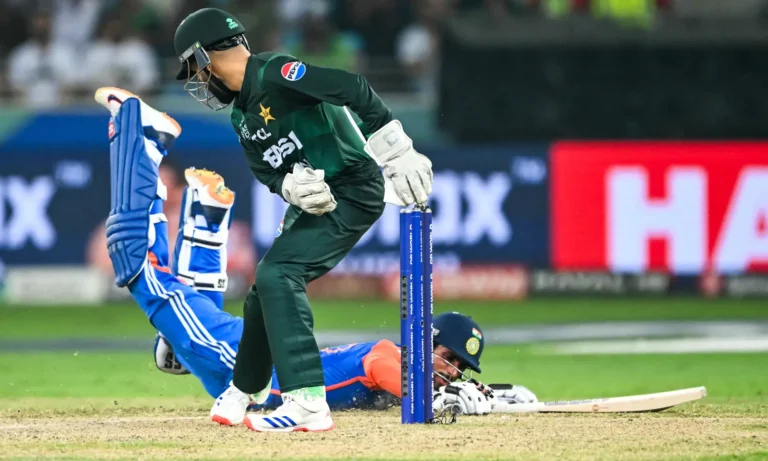The India–Pakistan cricket rivalry has often been downplayed by officials and politicians, with claims that it is “just another match.” But the Asia Cup 2025 final at the Dubai International Cricket Stadium once again proved that this fixture is still very much a rivalry — one that grips millions on both sides of the border, carries heavy political undertones, and evokes raw emotions in the stadium, on the pitch, and across living rooms worldwide.
Also Read: Asia Cup 2025 Final Ends in Controversy as India Refuses Trophy from Mohsin Naqvi
The stadium was filled to capacity, buzzing with anticipation. Every cheer for a Pakistan boundary echoed like defiance, every Indian dismissal sent waves of jubilation across the green half of the stands. On the other side, silence or disappointment reflected the weight of expectation borne by India’s fans. It was this charged atmosphere that underscored the rivalry — a rivalry that transcends sport and remains rooted in history, politics, and pride.
The final itself was a perfect microcosm of this tension. Pakistan batted first and looked poised for a big total when openers Sahibzada Farhan and Fakhar Zaman dominated India’s bowlers. Farhan’s composed 57 and Fakhar’s 46 raised hopes of a turnaround after Pakistan’s earlier defeats in the tournament. Yet, once Farhan departed in the 10th over, the momentum shifted dramatically. Pakistan’s decision to opt for Hussain Talat instead of power-hitter Hasan Nawaz proved costly, exposing their middle-order weakness. The collapse that followed — losing nine wickets for just 62 runs — left Pakistan restricted to a modest 148, a total that looked 30 runs short of being truly competitive.
Despite the collapse, Pakistan walked into the field with defiance. Faheem Ashraf’s animated celebrations after dismissing India’s danger-men Abhishek Sharma and Shubman Gill showed the team’s fighting spirit. Captain Salman Ali Agha’s stunning forward dive to catch Indian skipper Suryakumar Yadav off Shaheen Afridi was another moment that fired up the crowd. Haris Rauf also delivered bursts of energy, sending back Gill to tilt the match briefly in Pakistan’s favor. These moments reminded everyone why the rivalry is so intense: it is not only about the result but about pride in every ball bowled, every shot played, and every wicket taken.
Yet India’s resilience ultimately outshone Pakistan’s aggression. Tilak Varma rose as the hero of the night. The left-hander’s unbeaten 69 off 53 balls was a masterclass in composure and shot selection. He seized on every loose delivery, with Haris Rauf’s wayward spells offering him plenty of scoring opportunities. Varma’s calm at the crease turned what could have been a nervous chase into a calculated pursuit, silencing Pakistan’s charge and keeping India on track.
Supporting him was Shivam Dube, whose raw power was on full display. His 33 off 22 balls, peppered with two sixes and two fours, broke Pakistan’s momentum completely. Though Dube fell late in the innings, the damage had been done, and India were only a few runs away from victory. Rinku Singh eventually hit the winning shot, sealing a five-wicket triumph for India and extending their dominance over Pakistan in recent encounters.
The final did not just deliver a cricketing contest; it reaffirmed the essence of the rivalry. From Gautam Gambhir’s fiery reactions in the Indian dressing room to the visible disappointment on faces in the stands, emotions ran as high as the stakes. Pakistan’s fighting spells and India’s composed chase illustrated why, despite political rhetoric or calls for boycotts, the cricketing world still looks forward to these matches more than any other.
The result was another title for India, their ninth Asia Cup crown, but the larger narrative was about the rivalry itself. For Pakistan, the missed opportunity highlighted the need for middle-order stability and smarter decision-making. For India, the win added another chapter to their legacy, though the controversy around political undertones continued to linger.
At its core, the match once again showed that India vs Pakistan is not just a fixture. It is a rivalry where every six, every wicket, every roar, and every silence tells a story of pride, passion, and the unyielding bond between cricket and national identity.



1 Comment
Pingback: England All-Rounder Chris Woakes Announces Retirement from International Cricket - theteampk